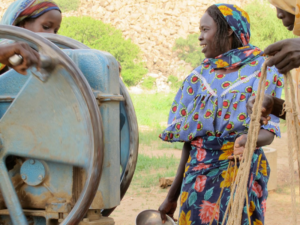Enhancing the Potential of Micro, Small and Medium Enterprises to Innovate and Provide Products and Services that Have Positive Adaptation and Resilience Outcomes

The micro, small and medium enterprises (MSMEs) are the backbone of low- and low-middle income country economies. MSMEs play a vital role in providing employment, goods and services and are often hubs of entrepreneurship and innovation in countries of the Global South.
Adaptation to changing climatic conditions matters to MSMEs in two different ways (Klein et al. 2022): Initiatives may relate to enterprises which (a) protect their own interests by climate-proofing their value chains and business operations (e.g. climate-resilient infrastructures for SMEs); and (b) innovate and provide products and services in response to a market need in support of adaptation efforts in vulnerable communities (UNDP 2016, Schaer et al. 2018). The latter can, for example, comprise technologies for increased water resilience, climate-smart agricultural practices and technologies that combine both, emission-reducing effects and adaptation.
The team in PlanAdapt is increasingly engaged in activities to better understand needs, current state of knowledge, critical gaps and mechanisms through which we can build the capacity of MSMEs in developing countries so that they can adapt to climate change and contribute to the creation of climate resilient pathways. Clearly, the business case for adaptation will require levels of commitment and resources that go beyond the MSME sector.
PlanAdapt’s activities range across a variety of objectives:
- an increased understanding of the rationale and business case for MSME actions in the context of climate change adaptation;
- learning from existing approaches, as well as the barriers, incentives and opportunities involved in catalysing the engagement of MSMEs in developing countries in adaptation efforts;
- exploring the potential for specific instruments and mechanisms conducive to triggering MSME actions and investments in adaptation;
- providing future directions to support and scale up MSME engagement in adaptation.

Traditionally the planning, financing and implementation of climate change adaptation measures were viewed as the responsibility of the public sector alone. With global estimates showing that the costs of adaptation in developing countries will considerably exceed the public sector’s financial resources, involving private actors and coordinating public and private actions are considered key to building climate-resilient societies in the face of climate change. While most adaptation-focused initiatives see adaptation impact and benefits as a public good/ service delivered by public sector institutions, it will be indispensable that (social) businesses and enterprises and private innovators will play a bigger role in the efforts around adaptation in the future.
Although enterprises are increasingly initiating mitigation measures (e.g. improving energy efficiency), they fail to see climate risks and adaptation as business as usual. Some, typically bigger businesses are starting to develop strategies for reducing and managing climate risks, for example, by climate-proofing their supply chains and developing goods and services of use in climate adaptation or disaster response e.g. water-efficient technologies, drought-resistant seeds, insurance products). However, this is more the exception than the rule, as most businesses are instead adopting a ‘wait-and-see’ approach, which may be a reflection of their short-term planning horizons.
We work, with many partners such as EIT Climate-KIC, CABI and igravity, to boost MSMEs‘ potential and capacity to move towards a more sophisticated way of collaboration between the private and the public sector in view of delivering positive adaptation and resilience outcomes, both as co-implementers and co-financiers.
In 2023, PlanAdapt works with EIT Climate-KIC to create case studies on adaptation and resilience-focused businesses participating in the Adaptation and Resilience ClimAccelerator, implemented by EIT Climate-KIC, KCIC Consulting Limited (KCL) and Concree SAS. Based on these cases studies, PlanAdapt will identify trends and needs of adaptation and resilience SMEs, with a focus on Africa. Furthermore, the intention is to help illustrate the new types of businesses and their models providing adaptation and resilience services and products, primarily in developing countries.
Find more previous PlanAdapt initiatives that could be of interest:
- The Role of Private Finance in Climate-Smart Agriculture (CSA) Technology Innovation in Africa and Asia
- Where Social Innovation, Social Entrepreneurship and Climate Change Adaptation Meet
- Evaluating and Enhancing Innovation in the Adaptation Fund’s Portfolio
In addition, we are running a kind of ideation and incubator space for adaptation solutions as part of our Climate Co-Adaptation Lab. If you are interested, join our team as Innovation Broker (Climate Change Adaptation and Private Sector Development/ Social Entrepreneurship).
There is an increasing amount of knowledge resources, inventories and networks (e.g. ASAP Accelerator Partnership and Ecosystem, Climate Expert, Global Innovation Lab for Climate Finance, Adaptation Solutions Taxonomy) to support MSMEs in view of adaptation and resilience outcomes. PlanAdapt aims to play a vital part in spreading them and enhancing uptake.
